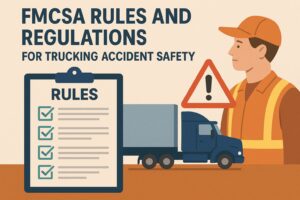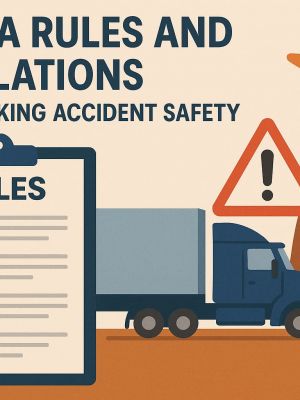FMCSA Rules and Regulations for Trucking Accident Safety
FMCSA trucking safety regulations establish comprehensive federal standards that govern commercial vehicle operations, driver qualifications, vehicle maintenance, and cargo securement to prevent accidents and protect public safety on Massachusetts roadways.
The Federal Motor Carrier Safety Administration (FMCSA) enforces detailed regulations found in 49 CFR Parts 390-399 that apply to all commercial motor vehicles weighing over 10,001 pounds. These Federal Motor Carrier Safety Regulations (FMCSRs) create legal obligations for trucking companies and drivers, and violations can establish negligence in accident cases.
If you or a loved one has been hurt in a crash caused by FMCSA violations, a skilled truck accident lawyer can help you hold negligent trucking companies accountable—contact Brooks Law Firm today for a free consultation and protect your right to compensation.
Key Takeaways
- FMCSA regulations cover hours of service, driver qualifications, vehicle maintenance, cargo securement, and drug/alcohol testing requirements for commercial vehicles
- Hours-of-service violations are among the most commonly cited factors in truck accidents, often involving driver fatigue and ELD tampering
- Driver qualification files must contain medical cards, driving records, and employment history which trucking companies sometimes fail to maintain properly
- Vehicle inspection and maintenance records provide crucial evidence of mechanical failures or safety violations that contribute to accidents
- Post-accident drug and alcohol testing requirements help establish whether impairment played a role in commercial vehicle crashes
Hours of Service Rules and Driver Fatigue
 Hours of service regulations under 49 CFR Part 395 are among the most frequently violated FMCSA standards and can contribute to serious truck accidents.
Hours of service regulations under 49 CFR Part 395 are among the most frequently violated FMCSA standards and can contribute to serious truck accidents.
The 14-hour rule limits the driving window for property-carrying drivers to 14 consecutive hours after coming on duty. Drivers cannot drive after the 14th hour, regardless of actual driving time completed. This rule prevents drivers from extending their workdays indefinitely through long breaks or delays.
The 11-hour driving limit restricts actual driving time within the 14-hour window. Drivers must take a 10-hour break before starting a new 14-hour period. The 30-minute break requirement mandates rest periods after 8 hours of driving time.
Weekly limits include the 60/70-hour rule, which prevents drivers from working more than 60 hours in 7 days or 70 hours in 8 days. Once drivers reach these limits, they cannot drive until completing a 34-hour restart period.
Driver fatigue significantly increases accident risks by reducing alertness, slowing reaction times, and impairing decision-making abilities. Federal studies indicate that fatigue contributes to a substantial percentage of serious truck accidents nationwide.
Electronic Logging Device Requirements
Electronic logging devices under 49 CFR Part 395 Subpart B automatically record driving hours and provide objective evidence of hours-of-service compliance.
ELD systems connect to vehicle engines and record driving time, engine hours, vehicle movement, and location data. This information creates detailed logs that cannot be easily altered, unlike paper logbooks that drivers could manipulate.
Required ELD data includes driver identification, vehicle information, location coordinates, engine hours, and duty status changes. The system automatically records driving time when vehicles move at speeds indicating highway travel.
ELD violations that may be discovered after accidents include device tampering, failure to use required systems, and attempting to edit or delete recorded data. Some drivers disconnect devices, use unapproved systems, or claim exemptions they don’t qualify for.
Accident investigations can reveal ELD data showing hours-of-service violations immediately before crashes. This electronic evidence provides strong proof of regulatory violations that may have contributed to driver fatigue and accident causation.
Driver Qualification Standards
Driver qualification requirements under 49 CFR Part 391 establish minimum standards for commercial vehicle operators and require comprehensive record-keeping.
Driver qualification files must contain specific documents for each commercial driver. Medical examiner’s certificates verify that drivers meet physical and mental health standards for safe vehicle operation. These certificates require renewal every two years unless medical conditions warrant shorter periods.
Essential driver qualification file components include:
- Current medical examiner’s certificate and any required exemptions
- Motor vehicle records from all states where licenses were held
- Employment applications with complete three-year work history
- Road test certificates or equivalent license verification
- Drug and alcohol testing records and consortium enrollment documentation
Trucking companies that fail to maintain complete driver qualification files may face liability when accidents occur involving unqualified or improperly screened drivers.
Vehicle Inspection and Maintenance Requirements
Vehicle safety regulations under 49 CFR Part 396 require systematic inspection and maintenance programs to prevent mechanical failures that cause accidents:
- Daily vehicle inspection reports (DVIR) must be completed by drivers before and after each trip. These reports document safety defects, mechanical problems, and any conditions that could affect safe operation. Drivers cannot operate vehicles with defects that would make driving unsafe.
- Most commercial vehicles require periodic inspections annually, with more frequent requirements for certain types. Qualified inspectors must examine brakes, steering, lighting, tires, and other safety systems according to federal standards.
- Maintenance records must document all repairs, preventive maintenance, and safety system work performed on commercial vehicles. These records help establish whether proper maintenance prevented or contributed to mechanical failures in accidents.
Common maintenance violations that contribute to accidents involve brake systems, tire conditions, steering components, and lighting systems. Deferred maintenance or inadequate repairs can lead to catastrophic mechanical failures at highway speeds.
Inspection and maintenance documentation provides crucial evidence in accident investigations. Missing records, overdue inspections, or documented safety defects that weren’t repaired may establish negligence when mechanical failures cause crashes.
Cargo Securement Standards
Cargo securement regulations under 49 CFR Part 393 Subpart I establish specific requirements for loading and securing different types of freight to prevent load shifts that cause accidents.
Cargo securement violations that could lead to accidents include:
- Insufficient number of tiedowns for cargo weight and type
- Using damaged or inappropriate tiedown equipment
- Failing to inspect securement devices during trips
- Improper load distribution causing vehicle instability
- Inadequate blocking or bracing for specialized commodities
General cargo securement standards require that loads be secured against movement in any direction including forward, backward, sideways, and upward. The combined strength of all tiedowns must meet minimum working load limits based on cargo weight.
Specific commodity rules apply to logs, steel coils, heavy machinery, automobiles, and other specialized freight types. Each commodity has unique securement requirements reflecting the particular hazards those materials present during transportation.
Load shift accidents can cause vehicles to overturn, jackknife, or lose control when improperly secured cargo moves during transportation. These accidents can result in serious injuries and extensive property damage.
Drug and Alcohol Testing Requirements
Federal drug and alcohol testing regulations under 49 CFR Part 382 mandate comprehensive testing programs for commercial vehicle drivers.
Types of testing that drivers are required to complete include:
- Pre-employment testing occurs before drivers begin safety-sensitive functions with new employers
- Random testing throughout employment helps detect substance abuse problems that develop over time
- Reasonable suspicion testing occurs when supervisors observe signs of possible impairment
- Post-accident testing requirements under 49 CFR 382.303 mandate immediate testing after accidents involving fatalities, injuries requiring medical treatment, or disabling vehicle damage with citations issued
- Return-to-duty and follow-up testing apply to drivers who violated testing requirements and completed substance abuse treatment programs
Testing violations that may contribute to accident liability include failing to conduct required post-accident tests, allowing drivers to refuse testing, and employing drivers with positive test results or testing violations.
Additionally, missing post-accident test results may indicate regulatory violations, especially when testing should have occurred based on the severity of the accident and its circumstances.
Commercial Driver’s License Standards
CDL requirements under 49 CFR Part 383 establish licensing standards and endorsement requirements for different types of commercial vehicle operations.
Class A licenses are required for vehicles with gross combination weight ratings over 26,000 pounds when towing vehicles over 10,000 pounds. Class B licenses apply to straight trucks and large buses over 26,000 pounds. Class C licenses cover smaller commercial vehicles carrying hazardous materials or passengers.
Endorsement requirements apply to specialized operations, including hazardous materials transport, passenger vehicles, school buses, and double/triple trailers. Each endorsement requires additional testing and knowledge verification.
Medical certification requirements ensure that all CDL holders meet federal physical and mental health standards. Medical cards must be current, and drivers with certain medical conditions need regular monitoring or special exemptions.
CDL violations that may contribute to accidents include operating without proper license classes, missing required endorsements, expired medical certificates, and driving with suspended or revoked licenses.
Accident Reporting and Record-keeping
Accident reporting requirements under 49 CFR 390.15 mandate that motor carriers maintain accident registers documenting all reportable crashes.
Reportable accidents include those involving fatalities, injuries requiring immediate medical treatment, or vehicle damage requiring towing. Carriers must record accident details, driver information, and any resulting citations or convictions.
Accident registers must be maintained for three years and made available during compliance reviews and investigations. Missing or incomplete accident records may indicate regulatory violations and inadequate safety management.
Record retention requirements apply to driver qualification files, vehicle maintenance records, hours-of-service documents, and testing results. These records provide crucial evidence in accident investigations and liability determinations.
How FMCSA Violations Affect Accident Cases
Regulatory violations discovered during accident investigations can establish negligence and strengthen injury claims against trucking companies and drivers.
Safety violations may indicate that trucks or drivers were operating unsafely at the time accidents occurred. Hours-of-service violations may prove driver fatigue, while maintenance violations could show that mechanical defects contributed to crashes.
Federal regulations establish industry safety standards that juries can use to evaluate whether trucking companies acted reasonably. Violations could suggest that companies failed to meet accepted safety practices.
Additionally, multiple violations may indicate systemic safety problems rather than isolated incidents within trucking operations. Patterns of regulatory violations strengthen arguments that companies prioritized profits over public safety.
Evidence preservation becomes critical immediately after truck accidents. Without proper legal action, electronic logging device data, maintenance records, driver qualification files, and drug testing results may be lost or destroyed.
Obtaining Evidence of Regulatory Violations
Accident investigations require prompt action to preserve evidence of potential FMCSA violations. The following evidence should be preserved immediately after truck accidents:
- Electronic logging device data and backup systems
- Driver qualification files, including medical certificates and driving records
- Vehicle inspection and maintenance records for the involved truck
- Drug and alcohol testing results and consortium enrollment records
- Company safety policies and training documentation
Professional legal representation becomes essential for obtaining this evidence. Lawyers understand what evidence to look for and how to obtain it through spoliation letters and legal discovery.
FAQ for FMCSA Trucking Safety Regulations
Which FMCSA Regulations Are Most Often Cited after Truck Crashes?
Hours-of-service violations under 49 CFR Part 395 are the most frequently cited regulations in truck accidents. These violations can lead to driver fatigue from exceeding driving limits or manipulating electronic logging devices. Vehicle maintenance violations under Part 396 and driver qualification issues under Part 391 are also commonly discovered during accident investigations.
How Do Electronic Logging Devices Work and What Data Can Prove Violations?
Electronic logging devices automatically record driving hours, vehicle location, engine status, and duty changes by connecting directly to truck engines. ELD data can prove hours-of-service violations by showing when drivers exceeded 11-hour driving limits, violated 14-hour rules, or failed to take required breaks before accidents occurred.
What Must Be Included in Driver Qualification Files?
Driver qualification files under 49 CFR Part 391 must contain current medical examiner certificates, three years of driving records from all states, employment history, road test results, and drug/alcohol testing documentation. Missing or incomplete files may indicate that trucking companies failed to properly screen drivers.
When Is Post-Accident Drug and Alcohol Testing Required?
Post-accident testing under 49 CFR 382.303 is required after accidents involving fatalities, injuries requiring immediate medical treatment away from the scene, or disabling vehicle damage with citations issued to commercial drivers. Tests must be conducted as soon as possible, preferably within two hours for alcohol and 32 hours for drugs.
What Cargo Securement Violations Commonly Cause Accidents?
Common cargo securement violations include using insufficient tiedowns for cargo weight, failing to inspect securement devices during trips, improper load distribution, and using damaged restraint equipment. Load shift accidents can be caused by inadequately secured cargo moving during transportation.
Legal Help for Your Massachusetts Truck Accident Case
FMCSA trucking safety regulations provide comprehensive standards designed to prevent commercial vehicle accidents, but violations occur and can contribute to serious crashes on Massachusetts roads.
Regulatory violations discovered after truck accidents can provide strong evidence of negligence and significantly strengthen injury claims. Hours-of-service violations, maintenance defects, unqualified drivers, and cargo securement failures all indicate that trucking companies failed to meet federal safety standards.
Time becomes critical in preserving evidence of regulatory violations. If you’ve been injured in a truck accident in Massachusetts, Brooks Law Firm can help you investigate potential FMCSA violations and fight for fair compensation.
Contact Brooks Law Firm today at (617) 245-8090 for a free consultation about your truck accident case. Our team speaks English, Spanish, and Portuguese, making legal guidance accessible to diverse communities throughout the Boston area.
Our personal injury attorneys work on a contingency fee basis, so you pay nothing unless we win. We are dedicated to helping families move forward, regardless of their background or circumstances.





